Annual Meeting Speakers
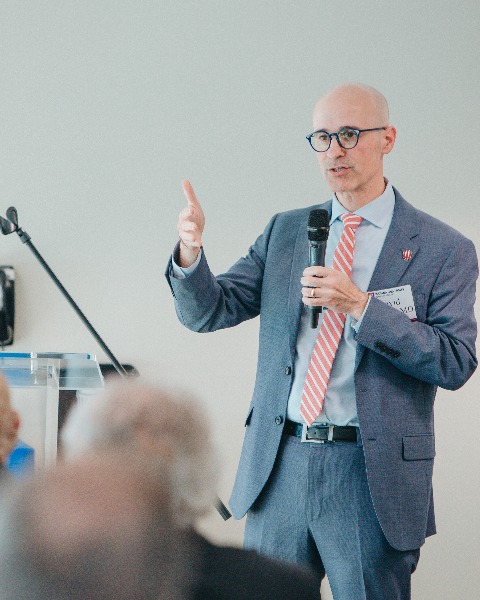 David M. Aronoff, MD, FIDSA, FAAM
David M. Aronoff, MD, FIDSA, FAAM
Chair, Department of Medicine, Indiana University School of Medicine
David Aronoff is the John B. Hickam Professor of Medicine and Chair, Department of Medicine, at the Indiana University School of Medicine. He received his Bachelor of Science degree in Microbiology from Indiana University and his Medical Degree at Tufts University in Boston. He completed internship, residency, and chief residency in Internal Medicine at Vanderbilt University and stayed there for both a clinical fellowship in Infectious Diseases and a research fellowship in Clinical Pharmacology. He then joined the faculty in Infectious Diseases at the University of Michigan where he also completed a research postdoctoral fellowship in Immunology. Dr. Aronoff returned to Vanderbilt in 2013 as Director of the Division of Infectious Diseases in the Department of Medicine with secondary faculty appointments in the Department of Pathology, Microbiology, & Immunology and the Department of Obstetrics & Gynecology. In Nashville, he established the Vanderbilt Preventing Adverse Pregnancy Outcomes & Prematurity (Pre3) Initiative, a collaborative, transdisciplinary group of investigators working in maternal-child health. From 2020 to 2022, as Director of the Division of Infectious Diseases, Dr. Aronoff’s efforts largely focused on responding to the COVID-19 pandemic. In 2022 Dr. Aronoff was recruited back to Indiana University to serve as Chair of the Department of Internal Medicine. Dr. Aronoff is an elected member of the ASCI and a Fellow in both the Infectious Diseases Society of America and the American Academy of Microbiology. His lab continues to study reproductive immunology and infections that complicate pregnancy. Dr. Aronoff has published more than 250 peer-reviewed manuscripts. He has held national leadership roles in the Infectious Diseases Society of America, the American Society for Microbiology, and is President of the American Society for Reproductive Immunology. He is a past Chair of the Pregnancy and Neonatology study section of the NIH.
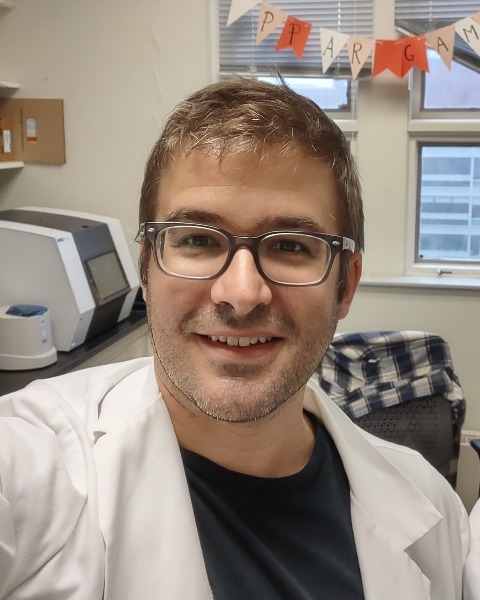 Jose Cordoba-Chacon, PhD
Jose Cordoba-Chacon, PhD
Assistant Professor, University of Illinois Chicago
Dr. Cordoba-Chacon earned a Master of Science in Biochemistry (2006), and a PhD in the Biomedicine program (2011) of the University of Cordoba in Spain. He completed his postdoctoral training in the Department of Medicine of the University of Illinois at Chicago under the supervision of Dr. Rhonda Kineman in 2017. During this training he studied how growth hormone controls whole-body and liver metabolism in different mouse models with external support of the Spanish Foundation Alfonso Martin Escudero, the Chicago Biomedical Consortium, and the Endocrine Society. In 2018, he was promoted to Assistant Professor (tenure-track position) in the Department of Medicine of UIC, and he was awarded a K01 mentored research scientist career development award by NIDDK, and the Early Investigator Award by the Endocrine Society. Since 2017, he has an independent research group in the Division of Endocrinology, Diabetes, and Metabolism that has been extramurally funded by two NIDDK research grants (R03 and R01), a pilot & feasibility pilot grant of the Diabetes Research and Training Center, and an Early Career Development Award of the Central Society for Clinical and Translational Research. The research interests of his group are focused on molecular mechanisms regulated by the nuclear receptor PPARgamma in hepatocytes that could promote metabolic dysfunction-associated steatotic liver disease.
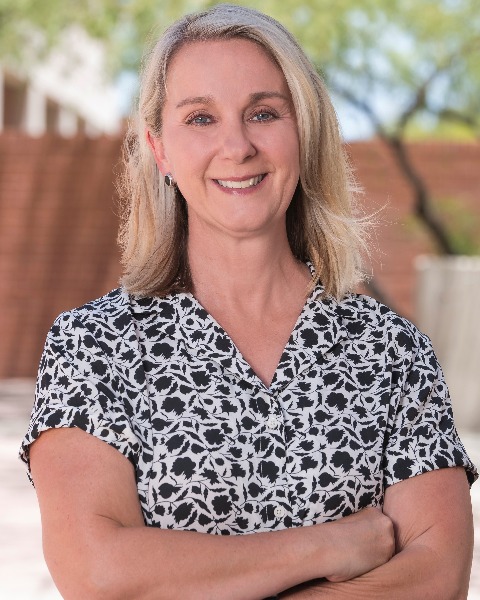 Lynn B. Gerald, PhD, MSPH
Lynn B. Gerald, PhD, MSPH
Assistant Vice Chancellor for Population Health / Research Professor of Medicine, University of Illinois Chicago
Lynn B. Gerald, PhD, MSPH is Assistant Vice Chancellor for Population Health Sciences at the University of Illinois Chicago and Research Professor of Medicine. She is an expert in pediatric asthma and has maintained continuous funding from NHLBI in school-based asthma interventions for 20 years.
Dr. Gerald has extensive experience in the areas of clinical, behavioral, and epidemiological research in respiratory medicine. She currently serves as PI of the American Lung Association Airways Clinical Research Center at the University of Illinois Chicago, and Co-PI of a clinical trial that is implementing proven effective interventions on the Navajo Nation to improve health disparities in pediatric asthma. She has also served as PI or Investigator on many NIH funded multi-center clinical trial networks including: Investigator for AsthmaNet; Investigator for the Lung Health Studies, Investigator for the COPD Clinical Research Network, and Investigator for the Precision Interventions for Severe and/or Exacerbation-Prone Asthma Network (PrecISE).
Dr. Gerald has held several leadership positions in the American Thoracic Society including serving on the Board of Directors, serving as Chair of the Behavioral Science and Health Services Research Assembly, Co-Chair of the Membership Committee, Co-Chair of the Research Advocacy Committee and as a member of the Finance Committee. She currently serves as a member of the Health Equity Committee and the Pediatric Health Policy Committee for ATS. Dr. Gerald has served as a member of the Clinical Trials Review Standing Study Section for the National Heart, Lung and Blood Institute and is also active in service at the local and state level. Her recent awards include the Respiratory Health Association, Lung Health Partners Award for Asthma, and the Senator Andy Nichols Award from the Arizona Public Health Association for outstanding contributions to public health through public health.
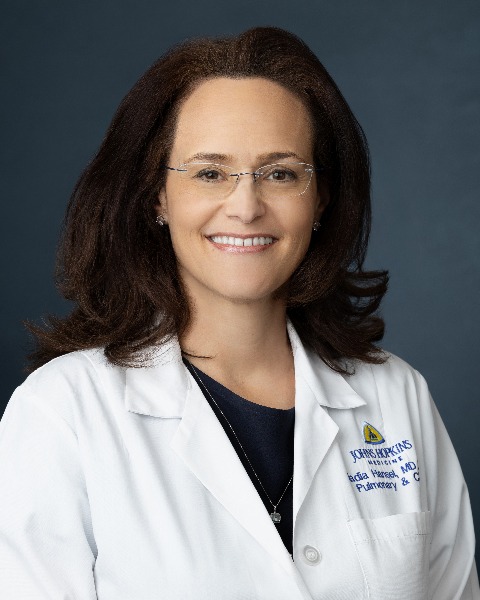 Nadia N. Hansel, MD
Nadia N. Hansel, MD
Interim Director, Department of Medicine, Johns Hopkins University, School of Medicine
Nadia Hansel, MD, MPH is the interm director of the Department of Medicine (DOM) in the Johns Hopkins University School of Medicine and interim physician-in-chief of The Johns Hopkins Hospital. A 1997 graduate from Harvard Medical School, Dr. Hansel completed her internal medical residency at the University of Pennsylvania before joining Johns Hopkins to complete a master's in public health at Johns Hopkins University in 2001. Simultaneously, she began a fellowship in the Division of Pulmonary and Critical Care Medicine that she completed in 2004 before joining the faculty at Hopkins. In 2014, she was named associate dean of research at Johns Hopkins Bayview and chair of the Bayview Scientific Advisory Board.
Dr. Hansel directed the Division of Pulmonary and Critical Care Medicine from 2019 until she became interim director in 2022. During that time, she was elected to the American Society for Clinical Investigation (ASCI) and received an Annual Sponsorship Award from the DOM Task Force on Women’s Academic Careers in Medicine. She also leads the Development Core of the Collaborative Centers in Children’s Environmental Health Research and Translation funded by the National Institute of Environmental Health Sciences. Dr. Hansel's areas of clinical expertise include chronic obstructive pulmonary disease and asthma. Her research focuses on understanding environmental determinants and sub-phenotypes of obstructive airway diseases.
 Kent Hoskins, MD
Kent Hoskins, MD
Associate Chief, Division of Hematology/Oncology, University of Illinois Chicago
Kent Hoskins, MD, is the Eileen Lindsay Heidrick Professor in Oncology and Associate Chief in the Division of Hematology and Oncology at the University of Illinois College of Medicine. He also serves as the Associate Director for Translational Oncology in the University of Illinois Cancer Center and the Medical Director of the Oncology Service Line for the University of Illinois Health System. Dr. Hoskins is a board certified Medical Oncologist who specializes in breast cancer and cancer genetics. His research program involves clinical, translational and population health approaches to the study of breast cancer disparities, with an emphasis on the intersection of precision medicine, social determinants of health, and tumor biology. His work has been published in high impact journals including the New England Journal of Medicine, JAMA, JAMA Oncology, and JAMA Network Open. Dr. Hoskins' research has been continuously supported through extramural funding from the National Cancer Institute, the U.S. Department of Defense, and the American Cancer Society since joining the faculty at the University of Illinois Chicago. Dr. Hoskins received his medical degree and completed an Internal Medicine residency at the University of Iowa, followed by a Hematology and Oncology fellowship at the University of Michigan.
 Jing Hughes, MD, PhD
Jing Hughes, MD, PhD
Assistant Professor, Washington University School of Medicine
Jing Hughes is an Assistant Professor of Medicine at Washington University in St. Louis. After completing her undergraduate and master's degrees in Biology at Stanford University, Jing received her MD PhD in Cell and Molecular Biology from the University of Pennsylvania, where she studied nuclear receptor signaling with Dr. Mitch Lazar. From there she completed residency in Internal Medicine and subspecialty fellowship training in Endocrinology at Yale University, then did additional postdoctoral training in Cell Biology and Physiology with Dr. David Piston at Washington University. Jing started her lab at WashU in 2019, studying pancreatic islet cell function and the role of primary cilia in hormone secretion.
 Jennifer Larsen, MD
Jennifer Larsen, MD
Louise and Morton Degen Professor, Internal Medicine, University of Nebraska Medical Center
Jennifer Larsen, MD, FACP, Louise and Morton Degen Professor, Division of Diabetes, Endocrinology and Metabolism, Department of Internal Medicine. Dr. Larsen graduated from the University of Iowa College of Medicine, completed internal medicine residency and endocrinology fellowship at the University of Utah School of Medicine, and completed a post-doctoral fellowship as an instructor at NIH before joining the faculty at University of Nebraska Medical Center in 1987. She has held many leadership positions within UNMC, including division chief for Diabetes, Endocrinology and Metabolism and most recently, interim director of the Mentored Scholar Program for Clinical Translational Research graduate program and Vice Chancellor for Research 2011-2022, during which time sponsored research funding repeatedly achieved record increases. She has been awarded multiple teaching awards and invited to lecture around the world. She has also held many national leadership positions including the American Federation for Clinical Research, the Association of Program Directors for Diabetes, Endocrinology, and Metabolism, The Endocrine Society, the AAMC’s research group, GRAND, and the Association of Academic Health Center’s Vice President of Research group. Her research has focused on the metabolic consequences of kidney and pancreas transplantation, and novel strategies to prevent diabetes and its complications in high-risk populations. She was a co-author of the American Diabetes Association’s position statement on Islet, Pancreas and Kidney Transplantation and the International Consensus Statement on Post-Transplant Diabetes.
 Angelia Lockett, PhD
Angelia Lockett, PhD
Assistant Professor of Medicine, Indiana University School of Medicine
Dr. Lockett is currently an Assistant Professor in the Department of Medicine, Division of Pulmonary, Critical Care, Sleep and Occupational Medicine at IUSOM where she is mentored by Dr. Roberto Machado, MD. Her research interests are to investigate the etiology of the vascular abnormalities that mediate pulmonary arterial hypertension (PAH), and to identify molecules or pathways to target for therapeutic intervention. She is specifically interested in identifying the role of maladaptive mitochondrial function which may alter metabolic pathways to promote the pathogenesis of PAH, and whether differences in mitochondrial gene expression and function exists in minority PAH patients which leads to higher mortality. Dr. Lockett’s research is supported by a Mentored Research Scientist Career Development Award (K01) and a University of Colorado School of Medicine PRIDE-AGOLD Institute Award.
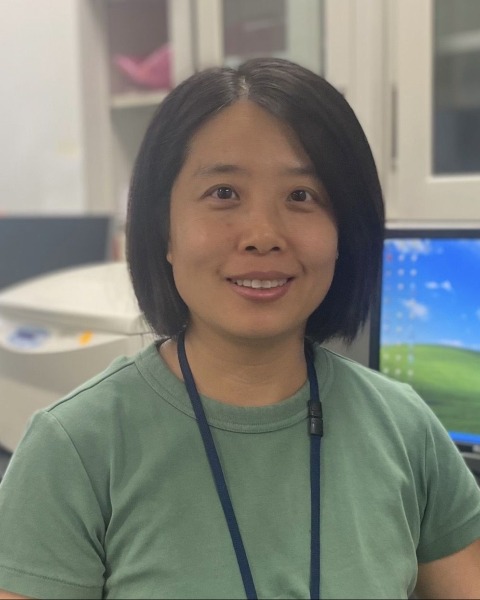 Jing Ma, MD, PhD
Jing Ma, MD, PhD
Indiana University School of Medicine
Dr. Ma's journey towards becoming a scientist is deeply rooted in her passion for research and discovery. This passion has been nurtured and refined during her doctoral studies at the NIAAA Intramural Laboratory of Liver Diseases, where she had the privilege of working under the guidance of Dr. Bin Gao, Senior Investigator and Chief of the Laboratory of Liver Diseases. Since Jing matriculated in her PhD training, her research areas focus on the basic mechanism of alcohol-induced liver injury. Jing worked energetically and reported the important role of pro-inflammatory mtDNA-enriched extracellular vesicles in mediating alcohol-induced liver injury, a work which was published in JCI Insight. She has an effective doctoral training, as illustrated by my scientific contributions and serving as a co-author in 4 high impact papers published in JCI, HEPATOLOGY, and Gut.
Jing joined the Division of Gastroenterology and Hepatology at Indiana University as a postdoctoral fellow in June 2020 under the mentorship of Dr. Suthat Liangpunsakul. By broadening her research areas to include both basic and translational studies while maintaining a focus on alcohol-induced liver injury, she is positioning herself to make even greater contributions to the field. Jing continues her productive career with co-authorship in 13 published papers in the span of 3 years since the inception of my postdoctoral training. These works are published in Journal of Hepatology, HEPATOLOGY, and JCI Insight. While the overarching theme of her work is on alcohol-induced liver injury, she has refined the scope of her work through an independent project to focus on the role of neutrophils in ALD pathogenesis. Jing has discovered 2 distinct phenotypes of hepatic inflammatory cell infiltration in SAH patients, one with high intrahepatic neutrophils, low CD8 T cells, and vice versa. This work, in which she serves as the first author, has been published at JCI.
 Sidharth Mahapatra, MD, PhD, FAAP
Sidharth Mahapatra, MD, PhD, FAAP
Associate Professor of Pediatrics, Children's Hospital & Medical Center / The University of Nebraska Medical Center
Dr. Sidharth Mahapatra is an Associate Professor of Pediatrics and the Director of Research in the Division of Critical Care Medicine. As both a physician-scientist and a pediatric intensivist working in a state with one of the highest incidences of pediatric brain tumors, he aspires to impact the life course of pediatric patients with medulloblastomas (MB), the most common malignant brain tumor of childhood. Dr. Mahapatra has worked to uncover therapeutically targetable pathways that trigger aggressiveness in these tumors. Now, he is leveraging this knowledge to design new therapies and repurpose FDA-approved drugs to augment the impact of current treatment strategies.
Dr. Mahaptra's clinical interest lies in the study of acute lung injury and pediatric acute respiratory distress syndrome (PARDS). As an active member of the Pediatric Acute Lung Injury & Sepsis Investigators (PALISI), he has shepherded his institute through several landmark studies aimed at uncovering pathophysiology and treatment strategies for patients with severe PARDS. Over his career, he has aspired to actively engage in the study of this debilitating condition with a singular focus on mitigating morbidity and mortality from PARDS in the field of pediatric critical care medicine.
Dr. Mahapatra has been the beneficiary of dedicated mentors during my growth as a physician-scientist. He hopes to follow in their footsteps and pay their lessons forward to the new generation of burgeoning investigators. To this end, he holds his role as a mentor to be amongst his highest responsibilities.
 Lauren Nephew, MD, MA, MSCE
Lauren Nephew, MD, MA, MSCE
Indiana University School of Medicine
Dr. Lauren Nephew is Assistant Professor of Medicine in the Division of Gastroenterology and Hepatology and the Associate Vice Chair of Health Equity for the Department of Medicine at Indiana University School of Medicine. Her research program focuses on understanding how the structural and social determinants of health contribute to disparities in liver disease and developing interventions that improve access to care.
Dr. Nephew completed Internal Medicine residency at Massachusetts General Hospital and Gastroenterology and Liver Transplantation Fellowships at the University of Pennsylvania. While at the Cleveland Clinic Lerner College of Medicine of Case Western Reserve University for medical school, Dr. Nephew completed a Master’s program in Bioethics. While at the University of Pennsylvania, she completed a Master’s of Science in Clinical Epidemiology.
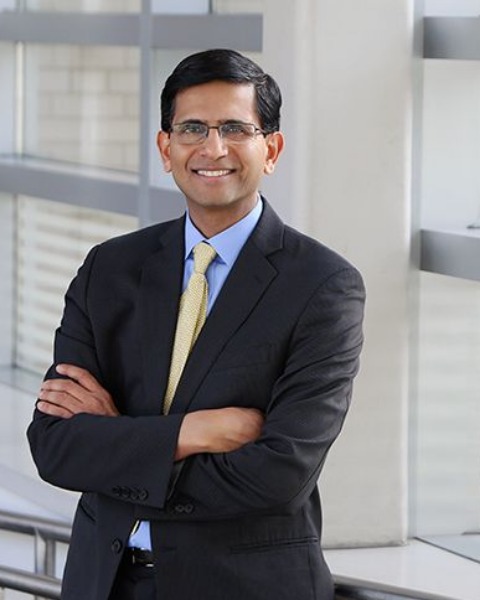 Sanjay Rajagopalan, MD, MBA, FACC, FAHA
Sanjay Rajagopalan, MD, MBA, FACC, FAHA
Chief, Cardiovascular Medicine , University Hospitals
Dr. Rajagopalan completed clinical and research fellowships in cardiovascular medicine and vascular biology at the Emory University School of Medicine, Atlanta, Georgia. Dr. Rajagopalan is among an elite group of physician investigators whose work has help transform perceptions and facilitate understanding of the global impact of chronic diseases including diabetes. He has additionally made seminal contributions towards the development of next generation therapeutic modalities for the treatment of cardiovascular disease and is a leading authority in advancing newer and innovative non-invasive approaches for the diagnosis of complex cardiovascular disorders.
Dr. Rajagopalan’s laboratory has been continually funded by the National Institutes of Health (NIH). Dr. Rajagopalan is an elected member of the American Society of Clinical Investigation (ASCI), the Association of University Cardiologists (AUC) and the Association of Professors of Cardiology (APC). Additional honors include the William Keating Award from the American College of Cardiology, the Charles Dana Award and being voted amongst the Best Doctors in America.
Dr. Rajagopalan has published over than 250 original peer reviewed research publications in journals such as JAMA, New England Journal of Medicine, Circulation, Journal of Clinical Investigation and Circulation Research, in addition to more than 300 reviews, book chapters and abstracts. He has served as an editor for at least two textbooks and several monographs on vascular disease and atherosclerosis.
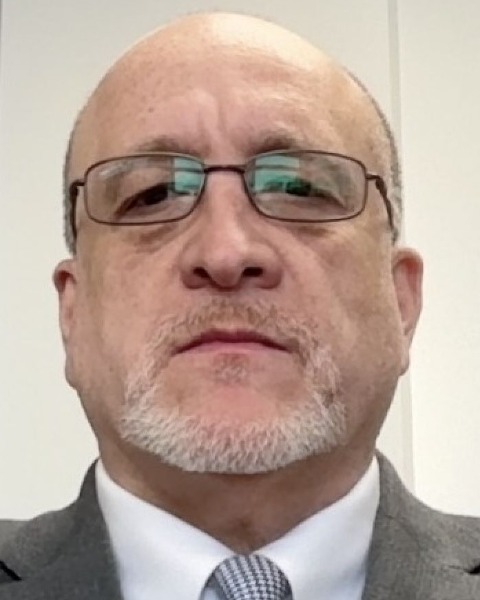 Hooman H. Rashidi, MD
Hooman H. Rashidi, MD
Associate Dean of AI in Medicine, University of Pittsburgh School of Medicine
Dr. Rashidi is a physician scientist, inventor of several well established and validated Data Science Apps/ Machine learning Platforms (e.g. MILO Auto-ML, MILO APT, STNG, etc.) and a prolific author. He is currently the Associate Dean of AI in Medicine at the University of Pittsburgh school of medicine, Professor & Endowed Chair of Experimental Pathology Research, Executive Vice Chair of Computational Pathology and the Executive Director of CPACE (Computational Pathology & AI Center of Excellence, a joint venture of U Pitt and UPMC). In light of his extensive background and experience in the machine learning and bioinformatics fields, he continues to create innovative new tools and resources along with published best practice guidelines that improve clinical practice, research, and education.
Dr. Rashidi is also a committed educator with numerous teaching awards and well established educational Apps. His efforts in the AI-ML & digital space are internationally recognized, as evidenced by his active numerous invited talks (at numerous prestigious institutions and conferences), his various editorial (associate editor of ML for Modern Pathology & associate editor of ML for JPI) & reviewer roles in this domain, his numerous published key invited review articles & his continued national committee roles within this space.
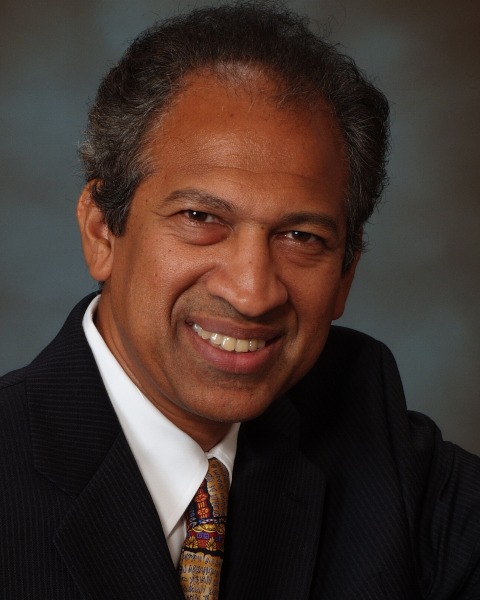 Kumar Sharma, MD
Kumar Sharma, MD
Vice Chair of Research and Director of Center for Precision Medicine, UTHSCSA
Dr. Sharma is a leading translational physician-scientist and author of over 215 original publications and 26 chapters with over 31,000 citations and an h-index of 92. He graduated from the Albert Einstein College of Medicine and completed his clinical and research fellowship in Nephrology at the University of Pennsylvania. He founded the Institute of Metabolomic Medicine at University of California San Diego (UCSD) and is currently the Vice Chair of Research and Chief of Nephrology at UT Health San Antonio. His lab has made numerous seminal discoveries over the past 25 years, including defining the role of TGF-β in kidney disease and defining mitochondrial dysfunction in diabetic complications. Dr. Sharma has focused his recent efforts on translating mitochondrial dysfunction in humans by the application of multi-omic technologies to identify new biomarkers and treatments. He established the Center for Precision Medicine at UT Health with funding from UT STARS, the NIH, NASA, DoD, VA, and industry. Using multi-omics and systems biology, he identified metabolite biomarkers linked to diabetes and kidney disease and established a spatial metabolomic platform that can identify mechanisms of disease across organ systems. This led to potential commercial products supported by SBIR funding from NIDDK, NIGMS, and NSF. Over the past 2 years, Dr. Sharma has led a large international effort to identify drivers of kidney disease (lactate and adenine) using technologies including metabolomics, single-cell RNA seq, mitochondrial functional measurements and development of novel assays for clinical applications. His work has been published in leading journals, including the JCI, Science, PNAS, Cell Metabolism, Diabetes, Diabetes Care, JASN, Kidney lnternational, Cell Metabolism, and Nature Medicine. His most recent work identified new biomarkers of kidney and heart failure with diabetes and novel metabolic therapies that could revolutionize treatment for diabetic complications.
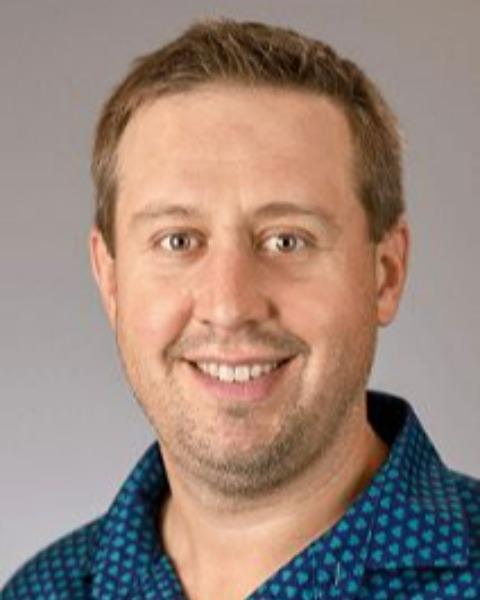 Tyler Shugg, PharmD, PhD
Tyler Shugg, PharmD, PhD
Assistant Professor, Indiana University School of Medicine
Tyler Shugg, PharmD, PhD is currently an Assistant Professor at the Indiana University School of Medicine (IUSM). Through his involvement with IUSM's Precision Health Initiative, Tyler is working on a number of projects to implement pharmacogenetics into clinical practice at IUSM-affiliated practice sites. In addition, Tyler holds an appointment within the Division of Clinical Pharmacology at IUSM where he pursues clinical and translational research projects aimed at advancing precision medicine approaches, including pharmacogenetics and management of drug-drug interactions, in patients with cancer.
Tyler earned his PharmD from Purdue University College of Pharmacy and completed his PhD in Clinical Pharmaceutical Sciences (with a focus on drug- and disease state-induced potassium channel regulation and arrhythmogenesis) at Purdue under the mentorship of Dr. Brian Overholser, PharmD. Tyler then completed a fellowship at the University of Michigan College of Pharmacy under the mentorship of Dr. Jasmine Luzum, PharmD, PhD focused on pharmacogenetics discovery before completing a fellowship at IUSM under the mentorship of Dr. Todd Skaar, PhD focused on precision medicine discovery and implementation.
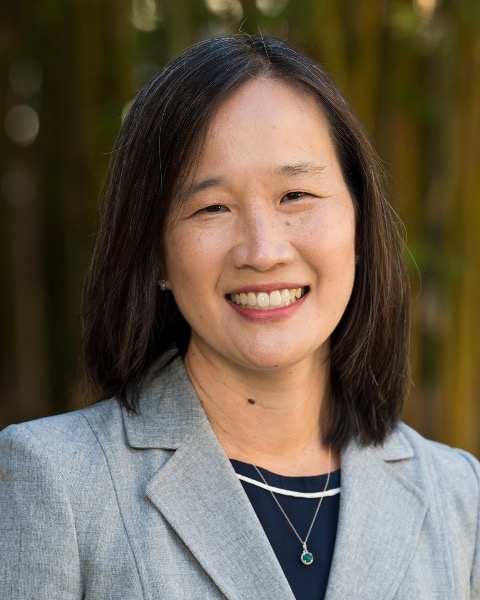 Joy Y. Wu, MD, PhD, FASBMR
Joy Y. Wu, MD, PhD, FASBMR
Chief, Division of Endocrinology, Gerontology and Metabolism, Stanford University School of Medicine
Dr. Joy Wu is Chief of the Division of Endocrinology, Gerontology and Metabolism and Vice Chair of Basic and Translational Science in the Department of Medicine at Stanford University School of Medicine. She earned her MD and PhD degrees from Duke University School of Medicine and completed her residency in Internal Medicine at Brigham and Women’s Hospital and clinical fellowship in Endocrinology at Massachusetts General Hospital and Harvard Medical School before joining the Stanford faculty.
Dr. Wu directs a basic and translational research program that focuses on skeletal development, stem cell therapies for bone, and breast cancer bone metastases. She was a recipient of the NIH Director’s New Innovator Award and her research has been funded by the National Institutes of Health, the Mary Kay Foundation and the Department of Defense. She has an active clinical practice focused on osteoporosis and bone health in cancer and has served on clinical guideline committees for the American Society of Clinical Oncology, the Endocrine Society, and the American Society for Transplantation and Cellular Therapy. Dr. Wu has served on the Board of Directors for the Endocrine Society and is currently a member of the Council of the American Society for Bone and Mineral Research.

